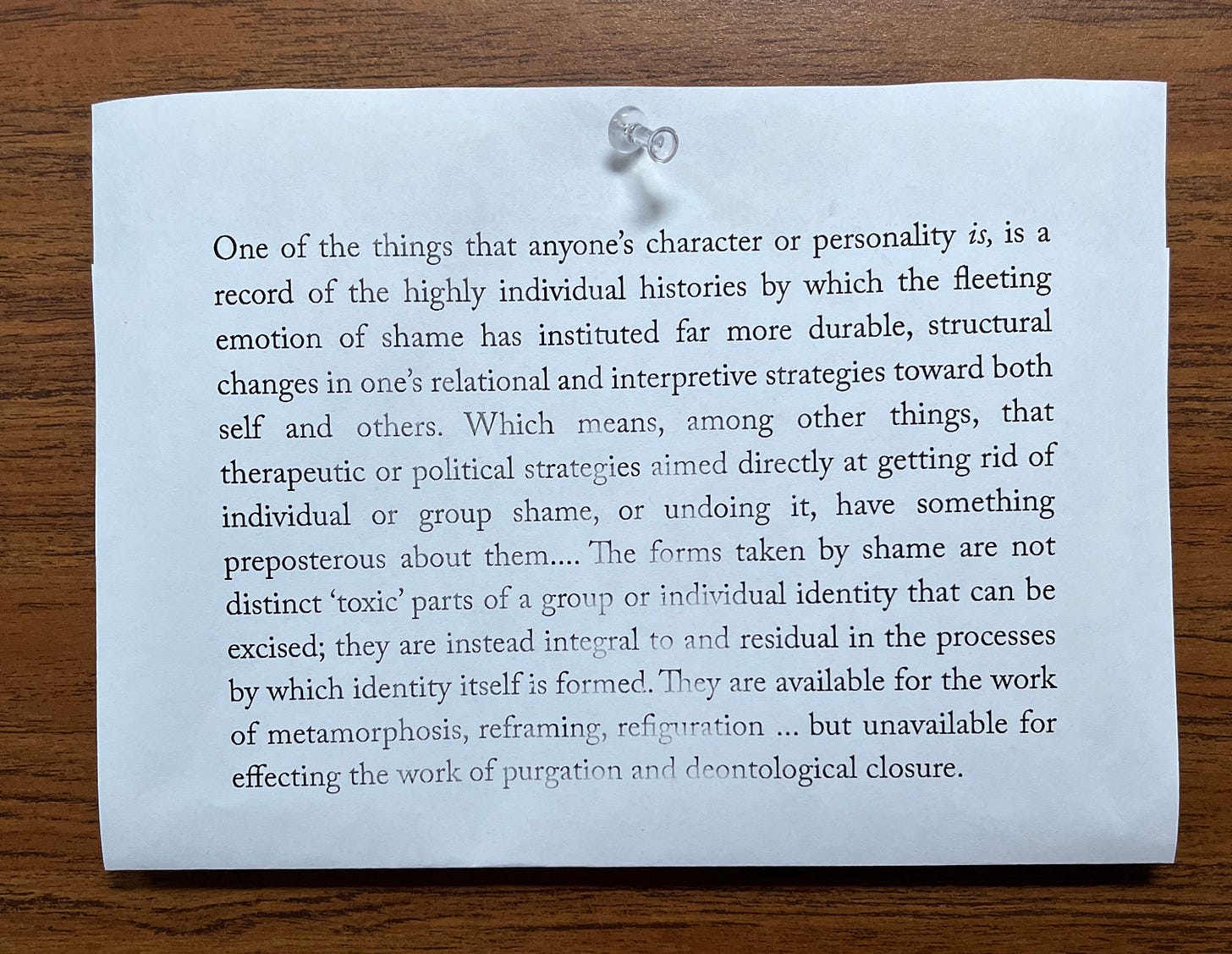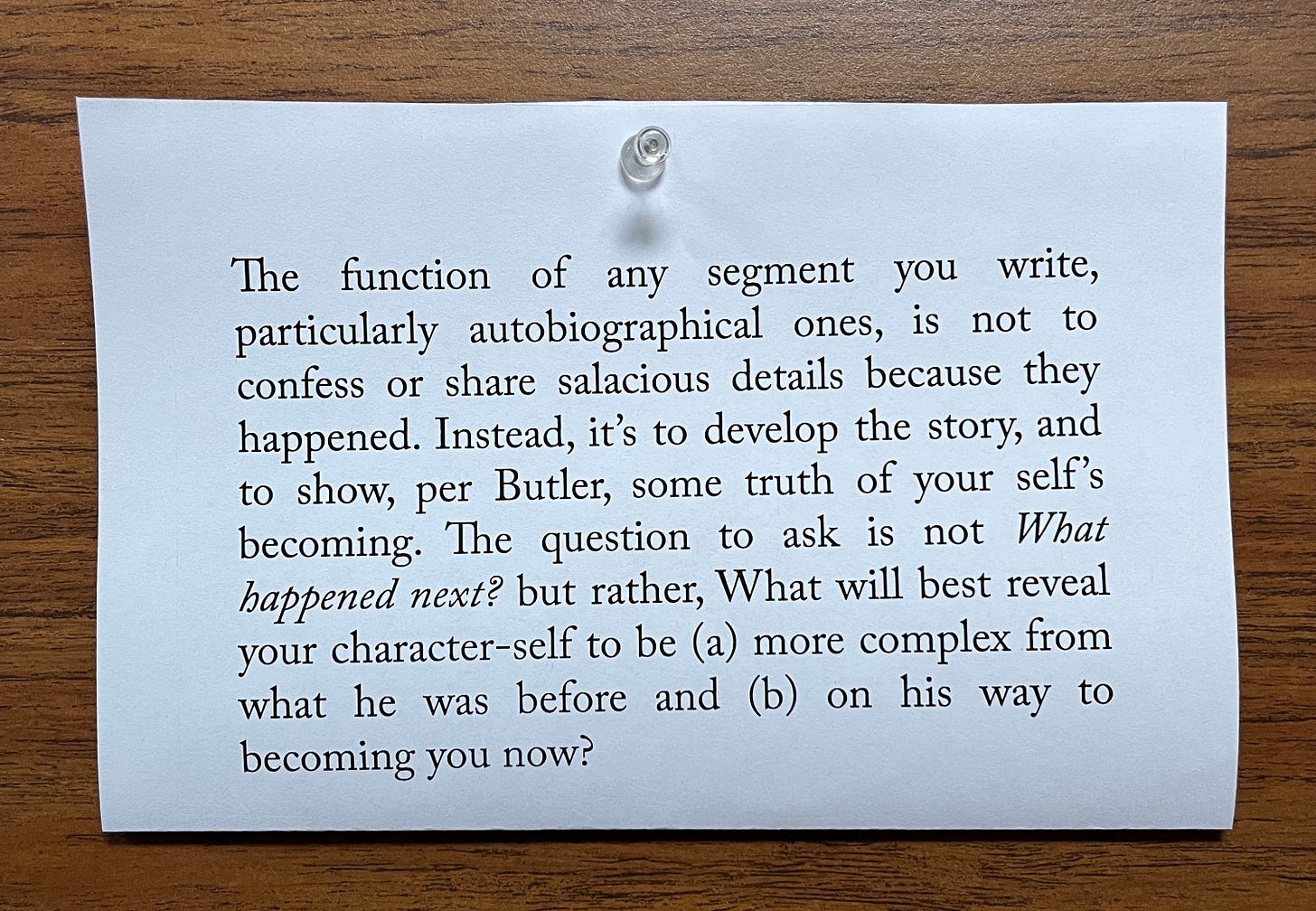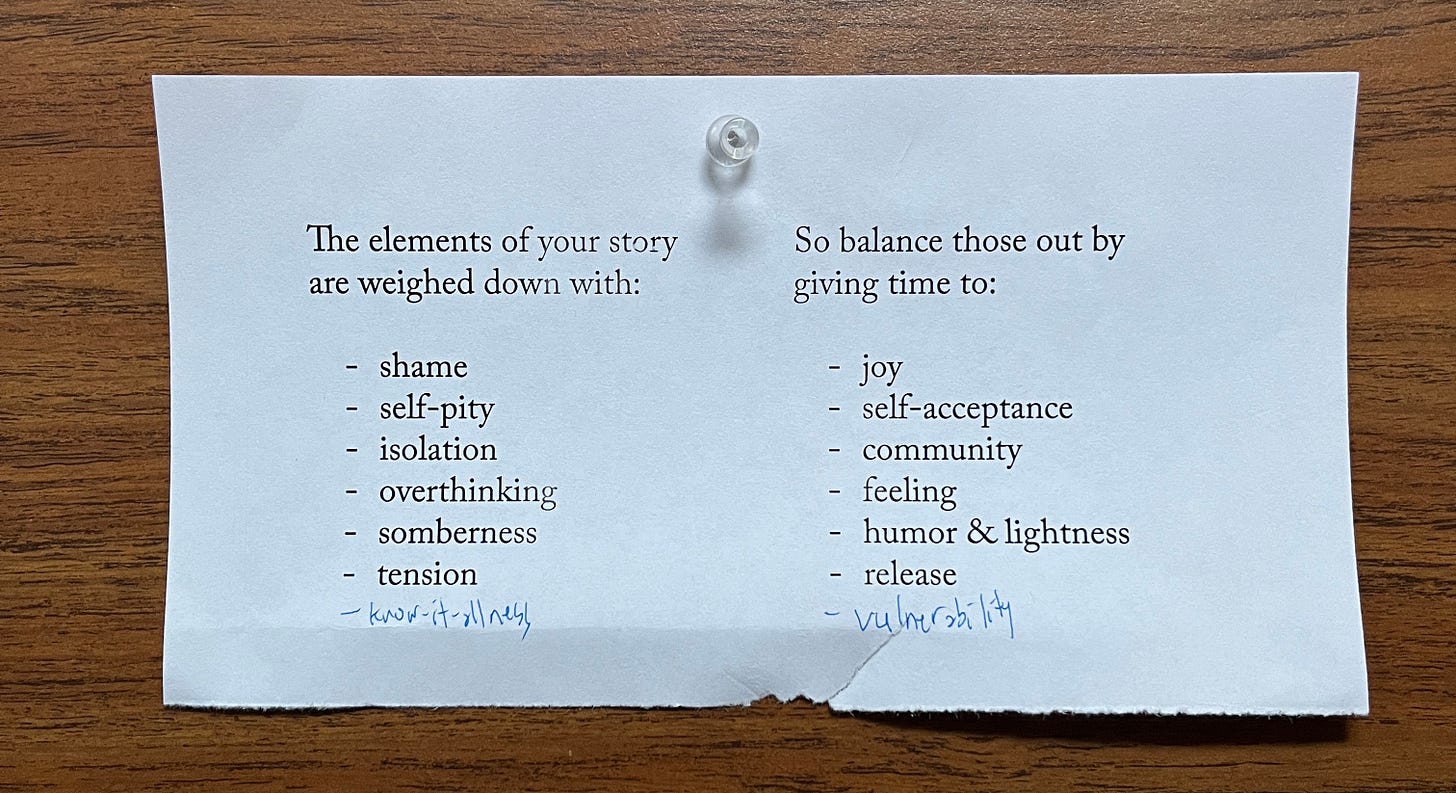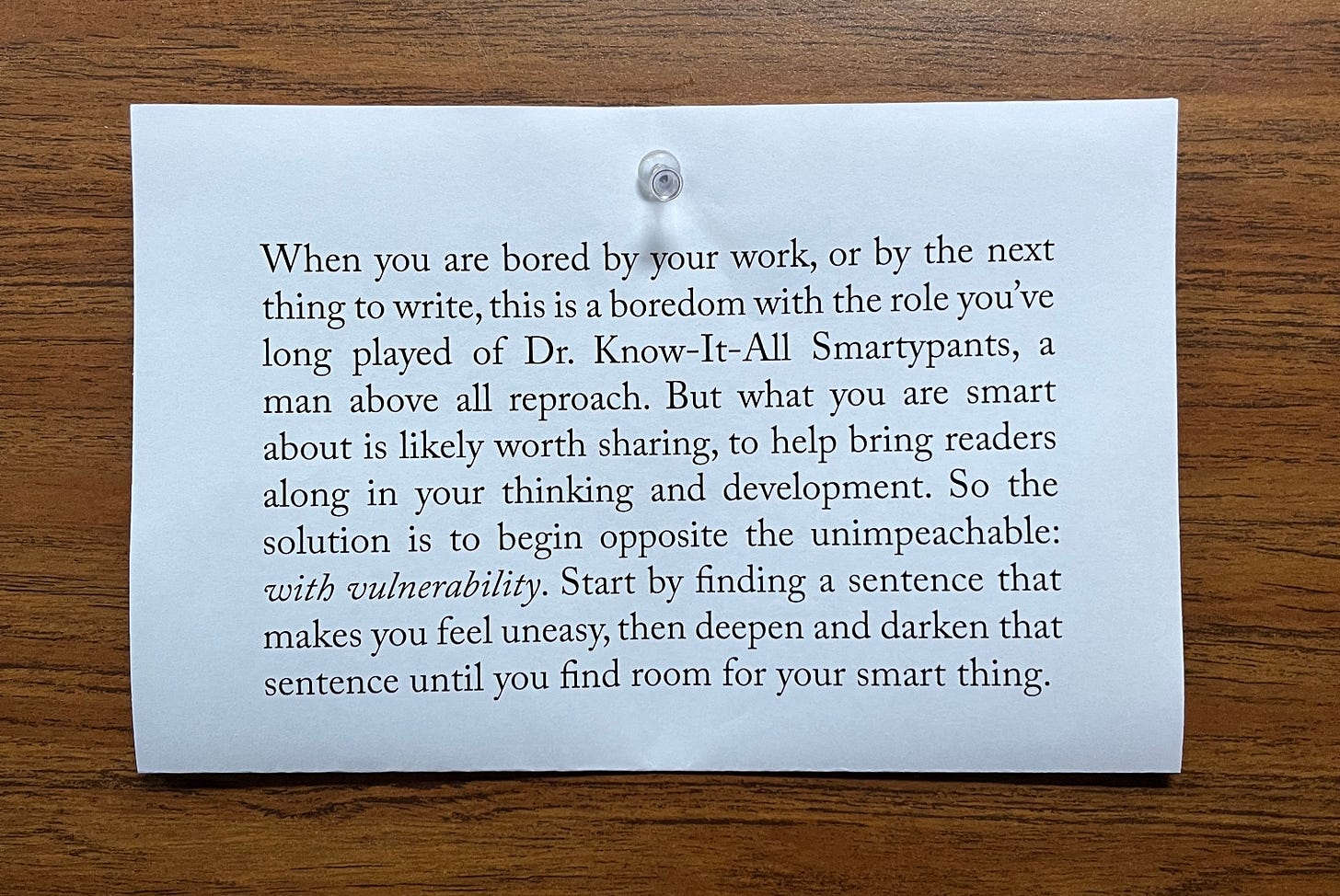Dear Friends:
In a couple of hours, I’ll board a bus that’ll drive me up Rte 29 from the Virginia Center for Creative Arts, where I’ve spent the last 4 weeks. I got notice of an opening while on vacation in Maine, and spent two days enumerating all the reasons I shouldn’t say yes to the offer: such a late notice, our July 4 plans, the cost of a last-minute flight, and couldn’t I just write harder and more at home this summer?
On and on it went, and I told N. I was going to say no, but then he said, ‘Dave, you’ve wanted a residency for so long. I’ll miss you on the Fourth, but you should take it.’
I have a man I love who loves me. (I get to see him again in 2 days!) What I’m saying is there’ve been lots of ways I’ve felt lucky this summer, and I hope yours has had good fortune as well. Shenny is still on summer hiatus, but I thought I’d throw this issue together to share some of the fruits of that luck, until I can share the book itself.
Here’s a pic (my studio is the far door):
Yours:
Dave
Endorsements: Artists Residency Edition
1. Process Interceptors
I had my first ever tarot reading here at VCCA, from my friend Bobby Abate, whose Outsider Tarot deck has turned tarot in my mind from corny arcana to inspiring tool for greater insight. (The reading they gave helped me find the wisdom in my last sign, below.) It was an extremely useful interruption in my general approach to writing, which I need lots of at residencies, lest things get stale. As a memoirist, I’m in no want for content to write (the challenge is figuring out what not to include), so standard Writing Prompts don’t help. What I like are interceptions on my process, and especially on my form, otherwise chapters are all Concepts! Concepts! Arguments! Quotes! There are any kinds of tools out there to let chance intercede fruitfully on your work. Tarot. Bibliomancy. I’m a fan of Brian Eno’s Oblique Strategies (there are a number of apps), because they make me puzzle things out on my own. Like, what am I as a writer supposed to do with the advice to ‘Feedback recordings into an acoustic situation’? I don’t know yet, but I’ll use it as the lamp to carry into the cave’s depths, and I trust I’ll find my way.
2. Overpacking
I packed two travel coffee mugs. A water bottle and a plastic water sippy cup thing with a straw. A ream of printer paper and my 2.5”-thick thesaurus. I wish I’d packed two pairs of readers, because before the end of week 1 my eyes were shot, but like an idiot I packed just the one pair and now need to cart them back and forth every day between my bedroom and studio. Overpacking is underrated, with people taking lots of pride in not having to check a bag on flights; I cede those folks their pride (I’ve felt it), but a multi-week residency is not the place to bring a little hobo bindle. And not a place to do too much laundry: Pack at least 12 pairs of underwear, 13 shirts, 10 pairs of socks, 8 kimonos, etc. Shower shoes for the pool and slippers for the studio. Your pillow from home, vacuum’d in one of those space-saver vacuum bags. Instant coffee packets to flavor-up the weak institutional coffee you’ll dispense every morning. When in doubt, toss it in. Here’s the thing: you’ll fall so deep in your project that any inconvenience will feel like an emergency, and the less you have to leave your studio to grab, the better. Check a bag and make it a game to surprise yourself on what you can imagine wanting—as I did with the sweatbands that are saving me on the long walks (part of my getting-unstuck process) I’ve been having to take in this 95° heat.
Writing Advice I Learned at My Residency
Maybe the verb I need is ‘remembered’ or ‘discovered’? If you’re not familiar with a residency, the general idea is that you apply to be accepted somewhere that will house and (ideally) feed you for a stretch of time, giving you also a studio to make art in. Your art can be writing, painting, photography, dance, music, video, sculpture, whatever. It’s a place where only artists are living together for 2, 3, 4, 8 weeks at a time.
Living in community has its challenges, but the benefit is how it feels like you’re in a bathysphere exploring the depths of your project, whereas usual everyday writing at home (especially during the semester) is like swimming laps over your material, without goggles.
So: you discover some shit. Or you remind yourself. You learn, I learn, and when I learn I need to remind myself before I forget. So I love a residency with a printer in the studio, so I can type my lessons up and make them into signs I tack above my workspace.
Here are the signs I made at VCCA:
It’s in my nature to attack nonfiction as a smartypants, a person with knowledge to show off. Look at all the research I did! I get hung up on being right and accurate, and while I know there are readers who go to nonfiction wanting historical accuracy, they are not my readers. I want readers who are looking for art, for an experience. So this index card taped under the windowsill I’ve stared out every day since June 22 is a reminder to think about the art experience I’m making. Don’t make it all up, but make the writing’s enjoyment and artfulness a priority over getting the facts right.
For example: I wrote a few weeks ago about the first pornographic scene I ever watched, as imprinted on my brain as The Golden Girls theme. I wrote it, and had some fun with it, made a couple jokes, kept the focus on what the scene was teaching me, if anything. Then I found the porno online, streaming for free, and watched the scene, and saw I got about half the details wrong.
Mild panic. I paced in my studio awhile. Soon it occurred to me: don’t name the porno. If I didn’t provide the title of the movie—which is a historical document; any of you could go watch it right now—then I could focus more on the experience I wanted to draw. I could let the memory lead the way. What else to do in a memoir?
This is a quote from saint, mother, genius, oracle, comedian, savior Eve Sedgwick, specifically her piece on the performativity of shame in Henry James’s introductions to the New York editions [PDF]. If the image sucks, I’ll blockquote it here:
One of the things that anyone’s character or personality is, is a record of the highly individual histories by which the fleeting emotion of shame has instituted far more durable, structural changes in one’s relational and interpretive strategies toward both self and others. Which means, among other things, that therapeutic or political strategies aimed directly at getting rid of individual or group shame, or undoing it, have something preposterous about them.... The forms taken by shame are not distinct ‘toxic’ parts of a group or individual identity that can be excised [sorry, Pride Month!]; they are instead integral to and residual in the processes by which identity itself is formed. They are available for the work of metamorphosis, reframing, refiguration, transfiguration … but unavailable for effecting the work of purgation and deontological closure.
Writing about shame, and writing scenes of my life where I’ve been led, waylaid, betrayed by shame, it’s easy for me to fall into the preposterous trap Sedgwick outlines here. There are if not creative then transfigurative uses of shame, and at the end of my residency I’m finally starting to get ahold of them. This Sedgwick quote has steered me toward the harder but smarter and in the end more useful (for myself and I hope one day for my readers) work at hand.
Seems obvious, looking back at this one. But another hard thing to remember when you’ve got the empty shape of a chapter to fill, which chapter’s material hovers around a certain time or topic from your life. There’s so much life you’ve lived! Let’s just go through it all, okay?
Not okay. ‘Butler’ there is Judith Butler, who writes helpfully in Undoing Gender about / against Foucault’s repressive hypothesis.1 (In short: we don’t repress sex, we’re impelled to speak of it all the time, most often in confession or therapy.)
‘We could read self-sacrifice as compelled by power,’ Butler writes, getting at Foucault’s original complaint, ‘but that would be to misread its desire and its achievement. The point is not to ferret out desires and expose their truth in public, but rather to constitute a truth of oneself through the act of verbalization itself. The first relies on a repressive hypothesis, the second emphasizes instead the performative force of spoken utterance.’
‘How are you able to write about shame without feeling it?’ someone asked me after the reading I gave here a couple weeks ago. My answer was less elegant than Butler’s notion of the performative force of utterance, but in so many words: You dare to speak the unspeakable. It doesn’t kill you. You survive, and you’ve become someone else.
More obviousness I easily forget. The handwriting I added after I tacked this up reads ‘know-it-allness’ under what’s by nature weighing things down, and ‘vulnerability’ under the stuff to work in as a counterweight. Which brings me to the last thing I learned, and just in time, too:
I am so tired of writing about sex. I am so tired of thinking intelligently about sex, and I am so tired of rendering in words past moments of me doing some kind (you name it) of shameful sex thing. W H O C A R E S ? ! ?
That’s the best transcription of the tired voice in my head most mornings. I know the answer is ‘Lots of people, probably, and eventually.’ But the one rule of writing I ever follow and teach, the only one, is You can’t be boring. So this is the way out of being boring, when I’ve written four times in earlier versions of this book the scene I need to write next, when I’ve Shenny’d about the argument I want to make about that scene, or when I’ve typed 18 pages of notes from some text I need to extract just like 2 sentences from to quote in mine.
Scare yourself. That’s the solution. Find the way in that makes you doubt you can ever pull it off. And then show those people what you’ve got.
Finally, this one2 just made me laugh, keeping my sense of humor close, and helping me remember ‘good writers’ don’t exist, so not to get hung up on trying to be one:
One morning, one of the worst I’ve had this month, I opened Oblique Strategies and got ‘How would you have done it?’
I was furious. How I would have done it was the exact thing I was trying to avoid. But if I use Oblique Strategies I force myself to follow it, or else it stops working, I get hung up on the very control that’s blocking me. So I typed in a notes doc the basic summary of how I would normally write the next segment I needed to write, and it was all as tedious as expected, until I got to the end:
…and maybe I’d say something in the final sentence about how despite what we might assume, given how much it’s about uncloaking and trespass, voyeurism wants mystery.And I got what I needed, my risky start to the segment: Voyeurism wants mystery? How is that possibly true?
What I’m saying with this final tip is that in writing, nothing good ever just comes to me. I have to pull it out of somewhere, often somewhere dark and uncertain. It’s like antiquing, when antiquing’s good. And with that…
This week’s thing I did not buy at the antique store is this canned-ham ad submitted by my good friend emily danforth, who found it in an antique store in New England, so I couldn’t have bought it if I wanted to:
Later somewhat relinquished, which Butler gets into.

















Because Brian Eno makes everything better.